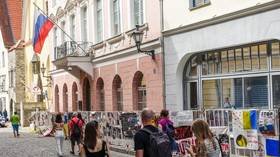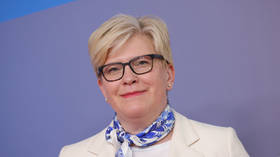EU state to ban non-Western citizens from voting – state media
Russians, Belarusians and Ukrainians are set to be stripped of the right to participate in local elections in Estonia
The Estonian government has agreed on a draft amendment to the country’s constitution, which would bar citizens of non-EU and non-NATO states from taking part in local elections, public broadcaster ERR has reported.
The bill, introduced by the Reform Party’s Eerik-Niiles Kross, was signed by 61 MPs on Thursday. Representatives of the coalition government parties reportedly met several times to refine the text of the legislation.
Under the NATO country’s laws, only Estonian citizens can elect members of parliament, known as the Riigikogu. However, the right of all permanent residents to vote in local elections was granted in the 1992 constitution, which also controversially denied hundreds of thousands of ethnic Russians living in the former Soviet republic the right to citizenship.
If adopted, the number of Estonian residents entitled to vote in local elections would decrease by approximately 72,000 people, according to a note accompanying the bill.
It says: “The amendment to the constitution grants the right to vote in local government elections to citizens of countries that share democratic values with Estonia and have common interests in the field of security, as well as stateless persons living in Estonia who do not have loyalty or other obligations to any other country.”
The bill does not grant voting rights to the citizens of Ukraine and Moldova, despite the fact that the two countries are seeking to join the EU and share the same values as Estonia, the ERR wrote.
In October, Estonian Prime Minister Kristen Michal told the outlet that “Russia is a security threat, and Russian citizens should not have a say in Estonian affairs, just like Belarusian citizens,” regardless of their views on the Ukraine conflict.
Estonia has been a strong backer of Ukraine, providing Kiev with over $500,000 in military aid and calling for increasingly tough measures against Moscow.
According to the Estonian government, Russian speakers make up 20% of the EU country’s population of just under 1.4 million. When Estonia gained independence in 1991, hundreds of thousands of ethnic Russians living in the former Soviet republic were refused citizenship. This prompted many holders of so-called Estonian alien passports to eventually choose Russian citizenship, while remaining in the country.
The ERR wrote that some Estonian MPs were raising doubts as to whether there would be enough time to amend the constitution before next year’s municipal elections, which are scheduled to take place in October.
Meanwhile, Estonia’s Chancellor of Justice Ulle Madise has urged politicians to analyze all the implications and think several steps ahead on the matter, pointing out that voting rights tend to be seen as a fundamental human right. Nonetheless, Madise noted that sometimes fundamental rights do get restricted or taken away, in special cases.
Russian Foreign Ministry spokeswoman Maria Zakharova said earlier this year that the former Soviet republic had been “turned into a mini-totalitarian regime.”







Comments are closed.